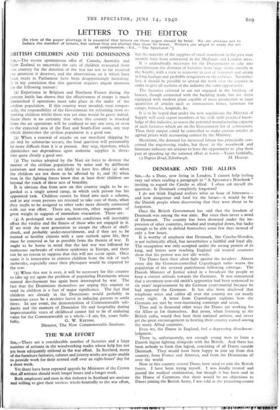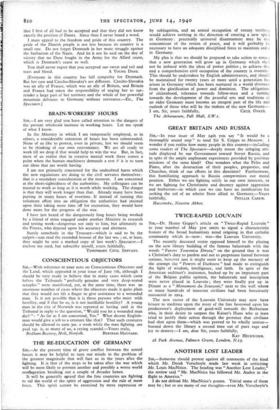DENMARK AND THE ALLIES
SIR,—As a Dane, now living in London, I cannot help feeling very sad when reading a paragraph in " A Spectator's Notebook " inviting to regard the Czechs as allied. I often ask myself the question: Is Denmark completely forgotten?
I do not think England realises what an hour of bitterness— and how dangerous and fatal for the future—it would be for the Danish people when discovering that they were about to be forgotten.
Once the British Government has said that the freedom of Denmark was among the war aims. But since then never a word of Denmark. The country has been drowned under the im- pression of other countries, invaded and trampled down, but lucky enough to be able to defend themselves some few days instead of only a few hours.
It is worthy of emphasis that Denmark, like Czecho-Slovakia, is not technically allied, but nevertheless a faithful and loyal ally. The occupation was only accepted under the strong protest of its king, and letters now reaching England via' neutral countries show that his protest was not idle words.
The Danes have their silent fight against the invaders. Almost every day the German-controlled Copenhagen radio warns the population of the severest punishment following sabotage. The Danish Minister of Justice asked in a broadcast the people to keep a correct attitude towards the Germans. It was announced that a seventeen-year-old smith's apprentice had been sentenced to six years' imprisonment by the German court-martial because he had opposed the Germans. It has also been disclosed that telephone wires and cables all over the country are cut nearly every night. A letter from Copenhagen explains how the Germans are met by ever-increasing contempt and scorn.
Thus and in thousand other ways the Danes are working for the Allies• as for themselves. But never, when listening to the British radio, would they hear their national anthem, and never get the great encouragement in hearing their country named among the many Allied countries.
Even we, the Danes in England, feel a depressing disacknow- ledgment.
There is, unfortunately, not enough young men to form a Danish legion fighting alongside with the British. And there has been nobody to form that legion, consisting of all Danes outside Denmark. They would have been happy to join up from this country, from France and America, and from the Dominions all over the world.
Now in this country several Danes have tried to join the British forces. I have been trying myself. I was kindly treated and passed the medical examination, but though it has been said in the House of Commons that there would be no objections to Danes joining the British Army, I was told at the recruiting-centre that I first of all had to be accepted and that they did not know esactly the position of Danes. Since then I never heard a word.
I must appeal to the freedom and pride of this country. The pride of the Danish people is not less because its country is a small one. Do not forget Denmark in her mute struggle against the barbarism of the Nazis. And let it not be said on the day of victory that no Dane fought in the Army for the Allied cause, which is Denmark's cause as well.
You shall never regret that you accepted our sweat and toil and [Everyone in this country has full sympathy for Denniaark. But her case and Czecho-Slovakia's are different. Czecho-Slovakia was an ally of France, which was an ally of Britain, and Britain and France had taken the responsibility of urging her to sur- render a large part of her territory and the whole of her powerful mountain defences to Germany without resistance.—En., The Spectator.]































 Previous page
Previous page